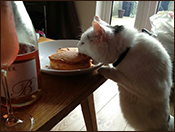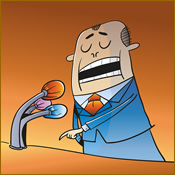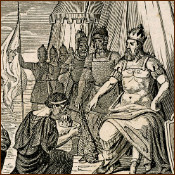In Praise of Thomas the Cake Cat

When I write or work from home, I’m generally not alone. My cat Thomas is usually sitting on the sofa beside me, curled up as close as he possibly can be. Often, he’s dozing.
Thomas is a remarkable character. He has lived with me for nearly 8 years. I found him, or rather, he found me when I was living in Bradford. Not long after I’d moved to the city, I was out in my back garden hanging up laundry on the line. A red folding chair stood on the deck. It was there I first caught sight of him. He is a big white cat with a few black markings. He looked rather regal sitting there, his paw draped over the edge in a leonine fashion. His eyes narrowed when he first saw me; in retrospect, I believe he liked me at first sight. He certainly was not afraid.
Thomas was a stray. Enquiries made around the neighbourhood indicated that he had been living by his wits and on handouts from humans for about 4 years. He became a regular at my back door, asking for food: he was always indulged.
March 2012 in Bradford was unusually warm: I recall driving through the Bradford Moor neighbourhood and seeing families play in the sunshine. In Bradford Moor Park, a father dressed in a kurta pushed his young son on a swing. The boy’s feet went higher and higher with each undulation, till he probably could see the clear blue skies through his bare toes. It seemed Spring had been given a miss and we had jumped into early Summer. The trees were in leaf and swayed in the strong, warm breeze. Thomas showed up in the mornings, walking along the top of the fence that enclosed my small garden. He ate his breakfast, then went out into the day, perhaps looking for a place in the sunshine to sleep after his repast.
April grabbed Yorkshire by the shoulder and brought Bradford back to its senses. A blizzard hit. I recall seeing heavy, thick snow pelting down and the trees bending in the cold wind. I had two other cats at the time, Sarah Jane and Amelia: I quickly went to the glass door leading onto the garden and let them in. Then Thomas appeared. He cried out. I let him in.
Not far from the door stood a cat basket which neither of my two cats had used. Thomas bounded directly into it and sat there as if it had always been his. It was clear from that moment that he was here to stay.
There is a photo which was taken not long afterwards, after Thomas had the inevitable tests for diseases such as Feline AIDS and Leukaemia (negative, thankfully) and had been neutered. By that time, Spring had been restored and I was able to wear a t-shirt again. In the picture, I am seated at a chair and using my laptop. Thomas had leapt up onto the chair arm and was looking at me. The next photo in the sequence shows Thomas peering at the screen with me. The impression given is that we are looking at the internet together. There have been photos over the years which show episodes in which he is peering at books I am reading and watching television with me.
As the years have passed, the bond between he and I has only grown stronger. Every evening, when I go to bed, he follows me up the stairs. I climb into bed. He leaps up beside me and curls up right next to my chest and stomach. I stroke his head and tell him what a remarkable boy he is. Sometimes I even sing to him, to the tune of “Little Donkey”:
Little Thomas, little Thomas
On the dusty road
Got to keep on, carrying on
With your heavy load
Little Thomas, Little Thomas
Such a lovely boy
Little Thomas, Little Thomas
He’s our pride and joy!
This tune came to me not long after he arrived: he had wandered far throughout Bradford, his paws were covered in callouses. As a result, he is named after the most well-travelled of Christ’s apostles.

If I’m not gripped by insomnia, we fall asleep; if I am trapped by wakefulness, we go down to my study. He sleeps beside me on the couch. But, after the nights that insomnia has loosened its grip, he will awaken me either with an intense stare from his big, dark eyes, or by digging his paws into my duvet covered back. We go downstairs. I put on the coffee and the radio. I fill his food bowl. He has his breakfast, I have mine. His love of food makes him a gourmet among cats; not long after he arrived, I discovered that he loves cake. A photo of him devouring a cake has become widely circulated on the internet. What the photo doesn’t tell you is that he also tried to eat the cake I bought to replace it. But it’s not just cake, he is so food oriented, I’ve also come up with another little ditty in his honour:
Food, oh food
I don’t mean to be presumptuous or rude
But when you’re a cat
Food’s where is its at
Life isn’t life without food!
Food, oh food
It’s not a question of fad or of mood
Savoury or sweet
It makes life complete
Life isn’t life without food!

In addition to inspiration, Thomas provides proof that animals do have emotions and they feel ours. There is another photo of me, taken while I was asleep in a chair. Thomas had leapt up onto my lap. He stared at me adoringly. When I am unhappy, somehow he knows, and sometimes he will reach out a reassuring paw to touch me. “It’ll be OK,” is perhaps what he is trying to tell me. As a result, when things go wrong, when the days are full more of hurt than laughter, he is there to remind me that life is not all like that. He is indispensible.
I set these words down knowing that Thomas’s presence on this earth is likely to be much shorter than mine. He is getting old. His hard early years have manifested themselves recently in aching joints; he is not as fast as he used to be, though often I can still see the kitten in him and when the sun is warm, he still plays like one. Nevertheless, I sometimes have to give him an anti-inflammatory drug to ease his stiff paws. I have quietly worried when I have had to help him get up onto surfaces that previously he could mount in a single leap. Sometimes he aches so much that after I aid him, I have to wipe away a sympathetic tear.
Furthermore, his early years exposed to the elements mean that he develops a black growth on his nose which falls off after a certain point: it’s a form of cat melanoma, which fortunately doesn’t threaten his overall health, though I closely monitor it. If he looks tired, I reassure him, pet him, tell him quietly, “You stay here with me” and tell him he looks “trim, and fit, and lovely”. He purrs in response. As I type these words, he again has put a paw on my leg. Is he encouraging me? Is he comforting me? I pet him again and repeat, “You stay here with me”. I think he will, as long as he can.
I have a reoccurring dream. I have died, and what lays ahead is a portal of light. And out of that portal steps Thomas to lead me to the next world. Sometimes our dreams tell us what awaits us, sometimes they speak to us of our hopes. All I can be certain of is that this street cat from Bradford has given me so much. I believe he feels similarly about me; I hope that everyone who has let a cat or dog or any other animal into their lives gets as much heartfelt joy.










 I'm a Doctor of both Creative Writing and Manufacturing and Mechanical Engineering, a novelist, a technologist, and still an amateur in much else.
I'm a Doctor of both Creative Writing and Manufacturing and Mechanical Engineering, a novelist, a technologist, and still an amateur in much else.




